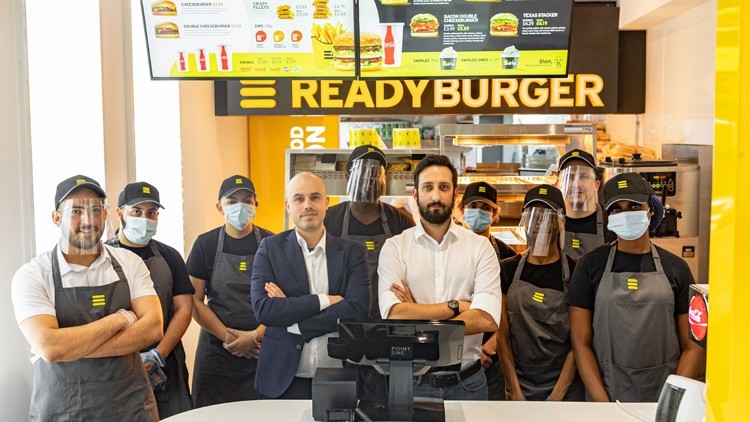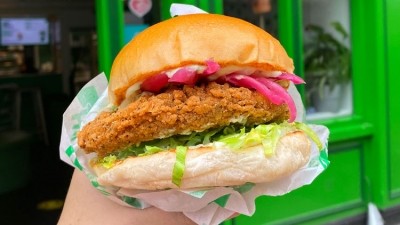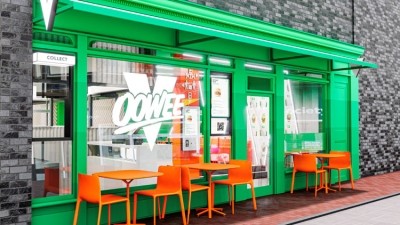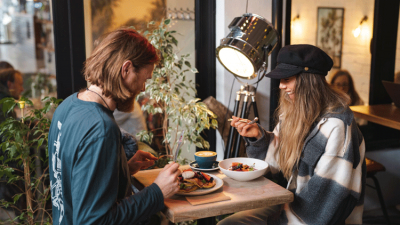Ready to grow: the vegan burger brand taking on the fast-food giants

Anyone with even a passing affection for the McDonald’s Big Mac may find themselves doing a double take when they come face to face with the Big Ready – one of the signature menu items served by fledgeling fast food chain Ready Burger. Visually, the similarities between the two burgers are uncanny: like the Big Mac, the Big Ready features two grilled burger patties sandwiched within a seeded, double-cut bun with cheese, lettuce, pickles and a house-made burger sauce.
Then there’s the price. While a £5.49 premium meal, with regular fries and a soft drink, at Ready Burger costs slightly more than the £5.09 charged at McDonald’s, the Big Ready burger on its own comes in at £3.59, consistent with the price of a Big Mac. And what of the taste? Again, there’s not much to tell them apart – the combination of the pickles, cheese, lettuce and sauce doing much of the heavy lifting in both cases.
It’s certainly a striking imitation, but there is one crucial difference. Tucked in the bottom right-hand corner of the Ready Burger menu, a small message sets out a key difference between this new kid on the block and the fast-food behemoth: ‘Shhh, we’re 100% plant based’.
“You’d be surprised how many customers don’t realise it’s vegan when they first come in,” says chef and Ready Burger co-founder Adam Clark, with a chuckle. “We had one who didn’t know until the fourth visit, I think. We’ve spent a lot of time working on our core products to make sure they are as close possible to their meat-based equivalents.”
Taking on the fast-food giants
Ready Burger, launched by Clark and entrepreneur Max Miller last summer, bills itself as ‘the first value-driven, fully plant-based quick service restaurant in the UK’. The brand made its debut on Park Road in London’s Crouch End with a small grab-and-go location with no seats and a single self-service screen, and has already gone on to establish a second, similar unit on Finchley Road.
This year, Clark and Miller plan to turn things up a notch, with further locations in Camden and Wood Green opening in the coming months. For the founders, Ready Burger’s mission statement is clear. “We want to show that there can be price parity between plant-based and meat products in the QSR space,” says Miller. “Often, there’s a barrier to entry with vegan fast food because the prices can’t compete with the big fast-food chains like McDonald’s and KFC, but we’ve worked out a way to do it.”
Until recently, the proliferation of plant-based fast food has been almost entirely concentrated in the more premium end of the casual dining market, with burger prices often pitched at between the £5 to £10 mark. Particularly in London, the vegan fast-food space is thriving. Notable players include Neat Burger, Oowee Vegan, The Vurger Co and Flower Burger, all of which have built up solid bases in the capital.
“You’d be surprised how many customers don’t realise it’s vegan when they first come in”
Many have also begun exploring regional opportunities. Neat Burger, which counts Formula One world champion Lewis Hamilton among its backers, has previously said it is looking to grow across the country, as well as continue to establish a dominant London presence; while the Milan-based chain Flower Burger, which arrived in London in 2020, has set out plans to open more than 40 sites in 'key UK cities' within a decade.
A shift in the QSR space has also begun. Last year, after three years of development, McDonald’s piloted its first ‘fully vegan’ burger, the McPlant, in select restaurants and has since rolled out its availability across its entire 1,300-strong UK estate. KFC, which has more than 900 locations across the country, has followed a similar path, recently bringing back its Original Recipe Vegan Chicken Burger permanently, having trialled it for a limited time last year. Burger King, whose plant-based Whopper was initially met with ridicule after it was revealed the patty was cooked on the same grill used for meat, has now launched a vegan Royale and vegan nuggets meal that are both certified by the Vegan Society.
It’s into this latter category that Miller and Clark hope Ready Burger will soon become a dominant force, and the pair are encouraged by this (Mc)flurry of activity by the fast-food giants. “For us, it feels great,” says Miller. “It’s true confirmation that people want these products.
“For such a big brand like McDonald’s to spend the time and research bringing a product like the McPlant to market, it’s exactly what we needed to show the world and our investors that this space is here now and it’s here to stay. It’s confirmation that this is really becoming a mainstream market.”
Ready Burger’s menu features seven core burgers. The cheapest, the eponymous Ready Burger, costs just 99p, making it the cheapest vegan burger currently on the market. Featuring a grilled patty with diced white onion, pickles, American mustard and Heinz tomato ketchup, it’s visually identical to a McDonald’s hamburger, and only 10p more in price. The cheeseburger and double cheeseburger similarly replicate respective McDonald’s products, and while the price point - £2.39 and £3.39 – doesn’t quite compete with the Golden Arches, they are still significantly cheaper than any of the plant-based burgers in the casual dining space, and both cost less than the McPlant.
It’s not just McDonald’s that Miller and Clark have taken cues from too. Ready Burger also serves a Chicken Challenger that is a dead ringer for a KFC fillet burger; and a Texas Stacker with crispy onion rings, black pepper mayonnaise and barbecue sauce that’s akin to a Memphis BBQ King burger from Burger King. Both are priced at £4.29, and count towards Ready Burger’s premium offering.
Much of the focus for Miller and Clark when developing the Ready Burger brand has been on making sure the cost of the core product allows them to compete with the wider QSR space. “We started off with a burger patty that had a base cost of £8, and every time we went through the processes of reducing the size we were able to make a saving, which we gave back to the customer, to the point where we had a price that was indexed against McDonald’s,” explains Miller.
“The first step was about ensuring we were satisfied with the product, and then the focus was on working out how to produce the burgers consistently and quickly. From there, we worked to establish the backend system, in order to ensure that what we offer is a seamless hospitality experience that compares to other major QSR brands.”
Building the patty
Miller and Clark met in late 2019. At the time, Miller was scouring the country looking for plant-based brands to invest in and encountered Clark when he visited his Sheffield restaurant Make No Bones, which also offered a vegan fast-food menu. Originally the pair planned to bring the concept to London with a view to expanding it nationally, but then the pandemic hit, and they chose to explore another idea, a vegan QSR brand, which they hoped could encourage more mainstream adoption of plant-based fast food.
“One of the biggest challenges from the start has been that because this is still an emerging space, there’s so little that’s scalable with this type of food,” says Miller. “While most of the prominent vegan burger brands use patties that are between two and four ounces, we wanted one that was 1.5 ounces. And we needed to be able to produce that on a large scale, so we’ve had to put those processes in place to ensure we can meet demand as we grow.”
The Ready Burger patty primarily consists of vegetables, namely oyster mushrooms, mushrooms and onion; coconut oil; and both soya and pea-based vegetable proteins. Rather than go down the route of using patties produced by prominent plant-based food producer Beyond Meat, as many of the more premium vegan burger brands have, Clark instead chose to partner with some smaller plant-based protein producers in order to ensure the burger was exactly as he envisaged but, crucially, could still be primed for mass production.
“I like [Beyond], but the flavour profile didn’t translate to the iconic QSR fast food experience, it had too many artisanal nuances to it,” he says. “With plant-based proteins and the different contents of fat and how it’s built as a core product, it means we have to go through so much testing to get it just right – looking at how it holds heat, and its flavour. The focus is on having a product that ensures consistency; whether we do one burger, 10,000 burgers or a million, they all need to come out the same.”
To that end, the pair say that while the uncertainty and periods of stasis caused by the pandemic have been frustrating from the view of the trying to get the business off the ground, it has given them time to ensure the product and the supply chain is where they need to be.
“We were always led by ‘flavour first’ and then we would work backwards to solve the problems through our supply chain,” continues Clark. “We worked on the patty 20 hours a day, for seven days a week to make sure we weren’t letting the brand down.”
This focus on having a recognisable QSR experience extends to the back-of-house processes put in place. Much time has been spent researching and developing a ‘fluid and specialist’ work-flow system that echoes that used in McDonald’s, with the burgers cooked on a specialist flat-top grill and a classic Ready Burger able to be assembled on a clear line in 17 seconds.
“We see ourselves as an extension of the factory line and the manufacturers we work with to build the patties, and we continue that through our workflow out to the customer. And at record low prices.”
Under the radar veganism
A key decision made by Miller and Clark early on was they didn’t want the Ready Burger branding to be defined by the fact it is a vegan concept. All menu descriptions eschew a mention of it being a plant-based product, the only tell being the message in the bottom corner.
“We’re very transparent in the way it’s communicated, but we’re not interested in shouting loud about being a vegan brand,” says Miller. “We know how much stigma is attached to the term ‘vegan’ and we want to remove that from a consumer’s decision making process as much as possible, because that’s how we feel mass adoption and consumer behaviour will change over time.
“If you’re a completely unassuming customer getting a chicken burger, you could order and eat it without realising it’s vegan.”
Unlike many of the main brands in the QSR space, Ready Burger has also chosen not to go big with a high footfall, central London location for its first site; instead opting for a suburban unit with no dine in option in an area with modest transport links. But while the impact of the pandemic and the reality of starting out with only limited funds fed into that decision, Miller says it was always part of the strategy to start small.
“Even if Covid and circumstance had been different, we wouldn’t have wanted to target a big, central London site to start with. Choosing to launch in a neighbourhood setting like Crouch End was driven by wanting to create a pilot store that gave us space to understand the principles and complex QSR structures, which we’ve done. And now, with that knowledge and a shift towards normalisation in the market, we’re looking to accelerate our plans to move away from just having smaller, suburban locations.
“Going forward, we’re going to be very data driven to understand recovery of footfall post Covid so we can understand what areas are doing well, and other metrics to help us determine how we position ourselves and what sites we look at over the next two years.”
Hungry for growth
A key vote of confidence in the Ready Burger brand early on was the success of its initial crowdfund. Launched after the opening of the Crouch End site, the fundraiser smashed its £1.5m crowdfunding target within hours of going live, and eventually closed having raised nearly £2m to help fuel its plans for growth.
“That really boosted our confidence and gave us a lot of faith,” says Clark. “We’ve got a great community of investors both privately and crowdfunded, and we’ve had a lot of support from them. It’s reaffirmed to us that the market is ready for this now. I’m not sure it was a few years ago, and in a few years’ time it might be a little too saturated. Timing is everything and I think we’ve come out with this at the perfect moment.”
Having now bedded in, Ready Burger is primed for its next stage of growth. For Clark that means broadening the menu. Later this year there are plans to launch a breakfast range, and further down the line he also hopes to create a ‘signature menu’ that will be a riff on McDonald’s now defunct premium-pitched ‘Signature Collection’.
“With regards to range, we want to have a menu that takes on McDonald’s. It’s about creating that same customer experience and building up the brand once we know we can facilitate it.”
“We’re hungry, and if the market can move with the industry in the next couple of years there will be a lot of opportunities for us to grow big”
Miller, meanwhile, is looking towards growing the estate. This year is unlikely to bring more openings other than those in Camden and Wood Green but beyond that are plans to explore dark kitchens and possible drive-thru locations. “When we’re ready, looking towards 2023 is when we want to start looking at launching some real flagship sites,” he says. “Subject, of course, to how we feel the recovery is going. We’re not truly out of this pandemic yet, which makes planning for the next three to five years quite tough.”
“We have our initial sites as a foundation, and our breadth of models including suburban, medium-size, flagship, drive thru, dark kitchens. It’s just an ongoing forming of strategy, which is moving towards bigger sites – high footfall, high demand locations, and really competing at the McDonald’s, Burger King and KFC level.”
Both Miller and Clark are aware they’re not going to reach an estate of that level overnight, but how many do they expect to open in, say, the next five years? “That’s the million-dollar question,” says Miller, with a smile. “It all depends on how our next few funding rounds go. We’re also looking at franchise and joint venture opportunities, and we’ve also been approached about global opportunities. But we want the brand to be right before we really explore that. Vegan QSR is a completely new category, and we want to learn before we’re able to impart our knowledge about what this brand is to others that want to replicate it.
“In five years, with joint ventures and franchise I don’t think it’s unreasonable expectation to look at 100 sites, but it will all depend on the dynamics of the market, and all the other metrics that come into building huge businesses. We don’t want to overpromise; we want to do the right thing by the business, the investors and everyone involved in the brand.
“We’re hungry, though, and if the market can move with the industry in the next couple of years, there will be a lot of opportunities for us to grow big. We’re ready to hit this market hard.”
![RB-BRMeal-1[1]](/var/wrbm_gb_hospitality/storage/images/media/images/rb-brmeal-1-1/4618373-1-eng-GB/RB-BRMeal-1-1.jpg)
![Max-Adam[1]](/var/wrbm_gb_hospitality/storage/images/media/images/max-adam-1/4618427-1-eng-GB/Max-Adam-1.jpg)
![RB_PR2-1-5[1]](/var/wrbm_gb_hospitality/storage/images/media/images/rb_pr2-1-5-1/4618391-1-eng-GB/RB_PR2-1-5-1.jpg)
![RB-External-1[1]](/var/wrbm_gb_hospitality/storage/images/media/images/rb-external-1-1/4618409-1-eng-GB/RB-External-1-1.jpg)

































